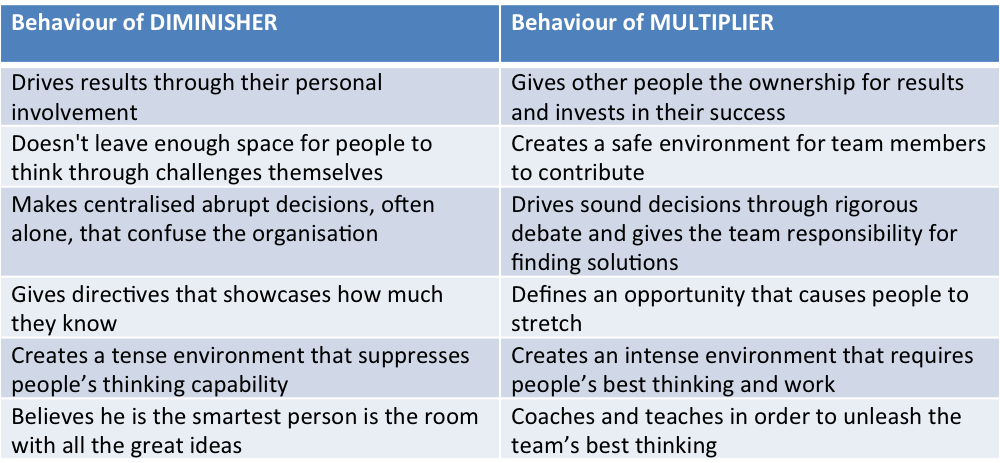The aim of this post is to explore these two types of leaders and to look at how you can become an empowering leader who gets the best from people, rather than someone who has a diminishing effect on others.
In her book, Multipliers, Liz Wiseman refers to these two types of leaders as Multipliers and Diminishers. She defines a Multiplier as someone who uses their intelligence to amplify the smarts and capabilities of the people around them. She writes,
Multipliers liberate people to think, to speak, and to act with reason. They create an environment where the best ideas surface and where people do their best work… The question “why” is at the core of their thinking. They ponder possibilities. They want to learn from people around them. At the heart of any challenge is intellectual curiosity. I wonder if we could do the impossible?
How do multipliers get people to step into a challenge? They shift the burden of the thinking to others. Initially, when they establish a concrete challenge, the burden of the thinking sits with them as the leader. But by asking the hard questions and inviting others to fill in the blanks, they are shifting the burden of thinking onto their people. It is in this shift that the Multiplier creates intelligence and energy around him or herself.
The opposite of a Multiplier is a Diminisher. The Diminisher's behaviour is a good reminder of the attitudes and behaviours that we should try to steer clear of. Wiseman writes;
Diminishers tell and test. Like the stereotypical Know-It-All, they tell people what they know, tell people how to do their jobs, and test other people’s knowledge to see if they are doing it right. Diminishers consider themselves thought leaders and readily share their knowledge; however, they rarely share it in a way that invites contribution. They tend to sell their ideas rather than learning what others know… They ask questions to make a point rather than to access greater insight or to generate collective learning… Rather than shifting responsibility to other people, Diminishers stay in charge and tell others – in detail – how to do their jobs…They are debaters, not Debate Makers.
Many Diminishers think that they are doing the organization and their team a favour by firmly driving the project forward but don’t realise the restrictive impact they are having on others. They have been promoted into a managerial role based of their results as an individual contributor and having had the right answers at the right time. But being a good leader isn’t about having the right answers and it’s not about setting the standard for others. It’s about unleashing other people’s genius rather than displaying your own. The behaviours in the below table gives you further insight into the behaviour of the two types of leaders.
The best way to find out if you are an accidental Diminisher is to ask for feedback. Ask people you work with how they perceive you and if they feel that their contributions are being appreciated by you. Don’t pressurise people into telling you what you want to hear. Explain that your goal is to become a better leader and that you value their honest feedback. You can for instance ask them what they think you should stop, start and continue to do, but give them some advance notice before you launch into the conversation. If you fear that your team won’t open up, you can ask for anonymous feedback, but when feedback is anonymous you miss out on the opportunity to further explore the comments and to use them to (re)build trust.
If you're up for it, you can also gain insight into your leadership style by taking this free test on Liz Wiseman’s website. I found it very revealing.
If you liked this post, you may also like:
Project Leadership - 20 essential tips
The Yin and Yang of Project Leadership
Lead through conversations, also the tough ones!
Project Management Coaching
What are the differences between management and leadership?










 RSS Feed
RSS Feed